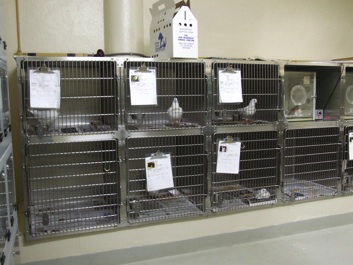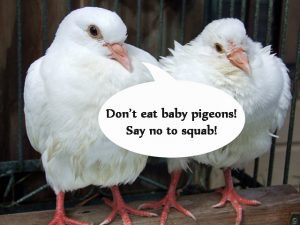Originally published in the Marin Independent Journal on 7/16/2011
By Elizabeth Young
There is an epic but almost invisible drama at work in the San Francisco Bay Area. Every week, unbeknown to most, local animal shelters get in a couple of beautiful, smart, all-white birds called King Pigeons. Most arrive as babies, only four weeks old, and they are usually weak and hurt. The few survivors that make it to the shelters have beat astronomical odds and yet they face euthanasia as their likely fate, unless they are rescued and adopted.

When I started volunteering at my local animal shelter in 2007, I had never heard of a King Pigeon and I was surprised to learn that each week, these smart, gentle birds were found, wandering starved and often injured, in parks and around town. King Pigeons are not wild. They are a domestic breed raised for meat. King Pigeons are bred to be big (for maximum meat yield) and white (so their skin will be pink) and are factory-farmed or raised by backyard breeders. Squab (which means baby pigeon) is served in French, Italian, American Haute and Asian cuisines and is sold live at poultry markets which is how a few king pigeons wind up in animal shelters rather than on a dinner plate.
Baby pigeons are cute and, while most that are sold live are butchered and eaten, some are purchased and “set free” by well-meaning but misguided people. King Pigeons have no survival skills and, with their bred-to-be-big bodies, never achieve the flight skills required to evade hawks, gulls and ravens. Their snow white feathers make them highly visible targets and their long history of domesticity has robbed them of their ability to find food and water and shelter. The “lucky” few that escape the butcher are usually killed by dogs, cats, birds of prey, cars and even mean people, often within hours of their “release”. How cruel that their brief freedom ends so tragically.
Yet, miraculously, a very few do survive long enough to make it to an animal shelter. Unfortunately and ironically, despite having escaped the butcher and survived the wild, these even “luckier” birds are almost guaranteed to be euthanized rather than get out alive which, after all the odds they’ve beat, seems particularly cruel. Animal shelters are stretched to their limits trying to care for and adopt out all the puppies and kittens and bunnies and budgies. They don’t have the resources to advocate for pigeons and people don’t know that they’re there needing homes.

Despite all their terrible luck, King Pigeons are actually very beautiful, smart and charming creatures and, when I met a tame, sensitive pet King Pigeon that, like all the others, was facing euthanasia, I knew I could find her a home and save her life. So I did. That effort grew to become first MickaCoo Pigeon & Dove Rescue and is now Palomacy Pigeon & Dove Adoptions with volunteers serving seven Bay Area counties. So far, we’ve saved the lives of more than 600 birds from being euthanized in shelters.

King Pigeons can live indoors as house pets (they can even wear pants) or outside year-round in an easy-to-create aviary. They are gorgeous, calm, simple to care for, smart and full of personality. And they want to live. We always has lots of King Pigeons available for adoption as do many Bay Area shelters. Please help us to save the lives of these gentle birds.
You can foster, adopt, volunteer and donate in support of their care. Until there are homes for all, please – don’t buy, don’t breed, adopt!
Apply online to foster or adopt
Donate to help rehome rescued King Pigeons
Read Squab Production- Another Cruel Delicacy
Sign our pledge to say no to squab
Elizabeth Young is an accidental pigeon rescuer and the founding director of Palomacy


